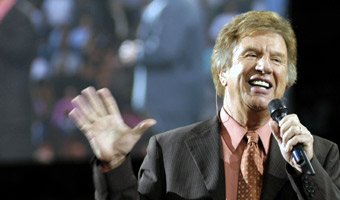Bush signs enhanced anti-trafficking bill
WASHINGTON (BP)–President Bush signed into law Dec. 23 a bill to strengthen efforts to fight human trafficking in the United States and other countries.
The president signed the William Wilberforce Trafficking Victims Protection Reauthorization Act during an oval office ceremony attended by supporters from Congress and the coalition that worked for the measure's enactment. Among those attending was Richard Land, president of the Southern Baptist Ethics & Religious Liberty Commission (ERLC).
"It's a tremendous victory," Land told Baptist Press after the ceremony. "I think all of us who were there were pinching ourselves that this bill actually got passed. The later in the day this got in this administration, the more unlikely [it was to become law]. We all were delighted and surprised.
"This bill will significantly assist the United States government in impeding the trafficking of women and child for sexual purposes," he said. "It's a tremendously important new tool available to law enforcement officials in prosecuting those who traffic in human flesh. It will make a real difference to the victims of sex trafficking."
Both the House of Representatives and Senate approved the bill without objection Dec. 10.
Enactment of the legislation followed a lengthy, contentious debate over competing pieces of legislation. Activists in the diverse, anti-trafficking movement strongly favored a measure approved overwhelmingly by the House last December over one proposed in the Senate. In the end, Congress passed a new bill more closely resembling the House version.
A majority of those trafficked across international borders are victims of sexual slavery or exploitation, though trafficking also includes forced commercial and domestic labor, as well as coercive recruitment of children by military forces.
About 800,000 men, women and children are trafficked across international borders each year, according to the Trafficking in Persons Office. This does not include millions of victims who are trafficked inside their own national borders, the office says. About 80 percent of the transnational victims are females, and as much as 50 percent are minors.
The trafficking office has estimated as many as 17,500 people are trafficked into the United States each year.
The legislation, supporters say, will:
— Significantly increase the ability of the State Department's Trafficking in Persons Office to thwart sexual and other forms of trafficking overseas;
— Strengthen prosecution efforts against trafficking in the United States;
— Increase punishment for traffickers;
— Enhance protections for trafficking victims in this country;
— Empower U.S. attempts to halt the use of children as soldiers in other countries;
— Require the Justice Department to produce a model law for states to use in investigating and prosecuting trafficking;
— Clarify federal law cannot be interpreted to consider prostitution as an acceptable mode of employment;
— Authorize a presidential award for exceptional efforts in the fight against trafficking.
At one point in the disagreement over the competing bills, Land and 13 other advocates for the House version warned Bush his own Justice Department was threatening to tarnish his legacy in the battle against trafficking. The Justice Department led opposition to the House-approved legislation while supporting a Senate version the ERLC and other anti-trafficking coalition members considered weaker.
Calling the Justice Department "out of step with your bold stance against slavery and human trafficking," Land and the others urged Bush in an August letter to bring the department into compliance with his policy goals and to provide unwavering support for the House-passed bill.
The Justice Department reportedly contended its opposition to the House measure was based on prosecutorial limitations placed on it by states' rights and a lack of resources.
Wilberforce, the English legislator after whom the new law is named, was an evangelical Christian who led the effort in Parliament year after year to outlaw the British slave trade, a campaign that finally succeeded early in the 19th century.
Compiled by Baptist Press Washington bureau chief Tom Strode.

 The gases are thought to contribute to the "greenhouse effect" that the vast majority of climatological scientists believe is causing a gradual warming of the planet.
The gases are thought to contribute to the "greenhouse effect" that the vast majority of climatological scientists believe is causing a gradual warming of the planet.